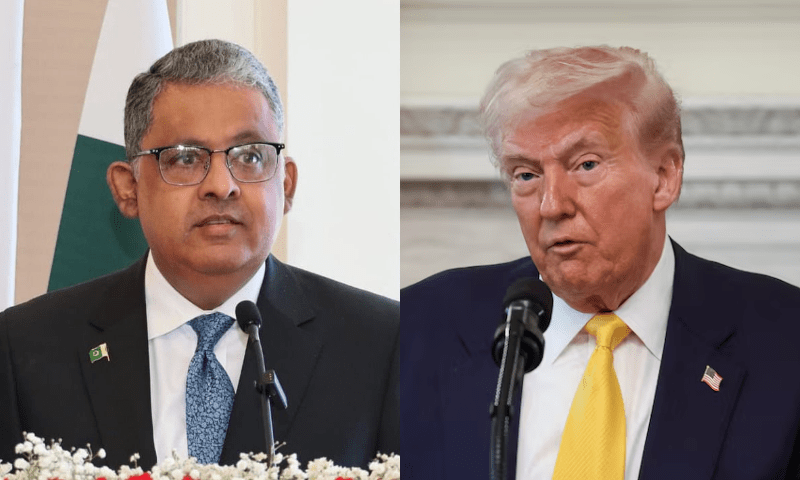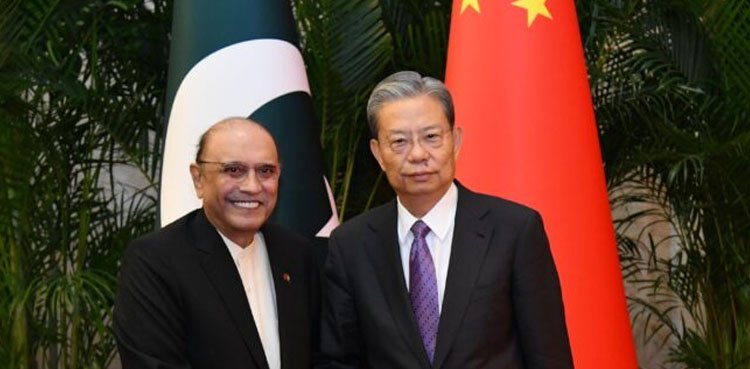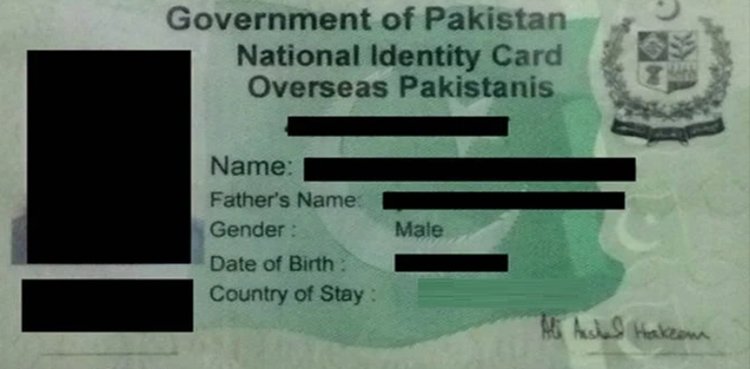Pakistan’s envoy to the United States has asked President Donald Trump to step in and help ease soaring tensions with neighbouring India in the wake of a deadly attack in occupied Kashmir, according to a report by Newsweek.
The April 22 attack in occupied Kashmir’s Pahalgam killed 26 people, mostly tourists, marking one of the deadliest assaults in the region since 2000. India has implied cross-border links without evidence, while Pakistan’s civilian and military leadership have rejected the accusation and called for a neutral probe.
Tensions have since spiked, with Pakistan reinforcing its forces and India’s premier granting “operational freedom” to his military. As Pakistan, in the early hours of Wednesday, said it expected an incursion from India within the next 24-36 hours, diplomatic channels from other countries have been engaged to prevent a possible military confrontation.
Pakistan’s Ambassador to the US Rizwan Saeed Sheikh told Newsweek yesterday that for a president “standing for peace in the world as a pronounced objective during this administration” — referring to Trump — there was no “higher or flashier flashpoint” than the Kashmir issue.
“If we have a president who is standing for peace in the world as a pronounced objective during this administration, to establish a legacy as a peacemaker — or as someone who finished wars, defied wars and played a role in de-confliction, resolving the disputes — I don’t think there is any higher or flashier flash point, particularly in nuclear terms, as Kashmir,” Pakistan’s Ambassador to the US Rizwan Saeed Sheikh told Newsweek.
“We are not talking about one or two countries in that neighbourhood who [sic] are nuclear-capable. So, that is how grave it is,” he said in an interview with the US magazine.
In his inaugural speech as the US president, Trump had said: “My proudest legacy will be that of a peacemaker and unifier.” A ceasefire, which has now been violated, was secured between Israel and Hamas following Trump’s election, and he has also been engaging with Ukraine and Russia to halt their war.
According to Newsweek, Sheikh contended that the Trump administration would need to pursue a more comprehensive and sustained initiative than in past US attempts to defuse crises that have erupted between Pakistan and India.
“I think with this threat that we are facing, there is a latent opportunity to address the situation by not just [focusing] on an immediate de-escalatory measure, or a de-escalatory approach,” the envoy said.
He called for a more durable and lasting solution to the Kashmir dispute, “rather than allowing the situation to stay precarious and pop up again and again at the next drop of a hat on this side or that side”.
During his interview, Sheikh emphasised that the Kashmir issue was the root cause of all troubles between India and Pakistan.
“Until and unless that final settlement is made and the resolutions dictate the prescribed solution is allowed to play out, we will all keep having these problems,” Sheikh said. “That’s why we insist on the United States and others playing a role in this situation and getting the de-confliction part activated,” he added.
If the long-standing dispute was resolved, the ambassador said, the population of South Asia could live in peace. “All the other issues between Pakistan and India are not major issues,” he noted.
“We do not want to fight, particularly with a bigger country,” Sheikh said. “We want peace. It suits our economic agenda; it suits our nationhood. It suits every objective that we have currently. But we want peace with dignity.
“We would not want to do it, but if it is imposed, then we would rather die with dignity than survive with indignity,” Sheikh asserted.
The call for Trump to play a role in reducing the tensions came the same day as US Secretary of State Marco Rubio was expected to speak to top Pakistani and Indian leaders.
In his phone call with Rubio yesterday, Prime Minister Shehbaz Sharif urged the US to press India to “dial down the rhetoric and act responsibly”.
In a readout of the call with PM Shehbaz, issued by the US State Department, Spokesperson Tammy Bruce said: “Both leaders reaffirmed their continued commitment to holding terrorists accountable for their heinous acts of violence.”
“The secretary (Rubio) urged Pakistani officials’ cooperation in investigating this unconscionable attack. He also encouraged Pakistan to work with India to de-escalate tensions, re-establish direct communications, and maintain peace and security in South Asia,” the statement said.
Meanwhile conversation with India’s External Affairs Minister S. Jaishankar, Rubio “encouraged India to work with Pakistan to de-escalate tensions and maintain peace and security in South Asia”.
Foreign policy ‘pivoting from geopolitics to geoeconomics’
Sheikh, reiterating Pakistan’s stance, rejected any involvement of his country in the Pahalgam attack, arguing that the fallout of such an operation could only serve to harm rather than benefit Pakistan’s interests.
“Pakistan is focusing on a matter of a deliberate, considered, pronounced shift of our foreign policy, a pivot from geopolitics to geoeconomics,” the envoy told Newsweek.
“We are focused on the geoeconomics side of our geography and our foreign policy. We are currently economically ascendant,” the official said, stressing that Pakistan only needed a “peaceful neighbourhood” in terms of the broader region.
Terming it “so outlandish, so far-fetched, to blame Pakistan” for the Pahalgam attack, Sheikh said Islamabad was awaiting evidence from New Delhi to prove a link between the incident and Pakistan.
Moreover, the envoy said the attack could be a “false flag operation” conducted to intentionally lay the blame on Pakistan. He acknowledged he could not yet back up the claim, but there was “enough circumstantial evidence, history, […] immediate backdrop and setting […] to entertain that possibility.
Speaking about India’s unilateral suspension last week of the Indus Waters Treaty (IWT), Sheikh warned that if there was “even an attempt or a semblance of an attempt” to stop or hold water, then it would be a declaration of war.
While contending that it was “physically impossible” to hold water, the envoy said “all bets are off if it’s about food security of 250 million people”.
“If you threaten me with this kind of a situation which is existential, what is your expectation of response?” he asked.
On the other hand, the Indian Embassy in Washington told Newsweek in a statement: “The terrorists behind the attack will be brought to justice.” It termed Sheikh’s remarks a “crude attempt to rewrite history and gloss over facts”.
Pakistan Army continues exercises as troops trade fire
Separately, state-run Radio Pakistan shared a video, dated April 30 and dubbed with a patriotic song, showing the Pakistan Army conducting several exercises.
“Pakistan Army is continuing war exercises with full vigour,” the report said. It quoted security sources as saying the exercises included a “practical demonstration of modern weaponry in view of war strategy”.

According to security sources, the exercises included “practical demonstrations of modern weaponry in view of war strategy”. The sources said the primary objective of the war exercises was to deliver a strong and decisive response to any aggression from the enemy.
They emphasised that the Pakistan Army remained fully prepared at all times to give a crushing reply to any hostile action.
“Officers and soldiers are actively showcasing their professional capabilities during the drills,” Radio Pakistan stated.
Similarly, Radio Pakistan also shared a video showcasing the Pakistan Air Force’s (PAF) military prowess and capabilities, including the JF-17 Block III that other countries have also bought from Pakistan.
“PAF remains steadfast to defend [the] aerial frontiers of Pakistan,” the video captions said.
Radio Pakistan reported that the PAF “fully prepared and determined to deliver a crushing response to any aggression”.
Noting that the PAF was equipped with the latest fighter jets, the report said the air force had “always fulfilled its professional responsibilities with utmost efficiency and dedication for the integrity of Pakistan”.
“The PAF is renowned worldwide for its technical expertise and courageous reputation,” it added.
The Pakistan Navy has also released a video, titled ‘Ready at all times’, featuring Chief of Naval Staff Admiral Naveed Ashraf.
“You must be battle-ready. The time has come to utilise our capabilities effectively,” Admiral Ashraf tells his troops in the video, which shows clips of various naval exercises.
“You get few opportunities to prove yourself. Our nation has a lot of expectations of us. We have to deliver, and deliver to the best possible efficiency before the enemy,” the naval chief says.
India’s navy today issued warnings for several firing drills in the Arabian Sea off the coasts of Maharashtra and Gujarat states. Gujarat shares a border with Pakistan.
The navy did not respond to a Reuters request for comment on the warnings.
As tensions remain high, both countries’ troops reportedly exchanged small arms fire along the Line of Control (LoC) in AJK for the seventh night since April 25, Reuters said.
While there was no comment from Pakistan today, state media yesterday reported that the Pakistan Army responded to overnight unprovoked Indian firing on the LoC. No casualties have been reported so far.
More than 1,000 seminaries close in AJK
More than 1,000 religious schools in Azad Jammu and Kashmir have been closed for 10 days as tensions rose between India and Pakistan, a local official told AFP today.
“We have announced a 10-day break for all madressahs in Kashmir,” said Hafiz Nazeer Ahmed, the head of Kashmir’s Department of Religious Affairs.
Ahmad told Reuters that security officials feared Indian forces may target seminaries and label them as militant training centres. The notification seen by Reuters, dated April 30, only cited a heatwave as the reason for the closure.
“Right now, we are facing two kinds of heat — one from the weather and the other from [Indian Prime Minister] Modi,” Ahmad said of the notification, saying they did not mention the risk of attacks in a bid to avoid panic.
Neelum Valley, a popular tourist destination northeast of Muzaffarabad, has seen investment of millions of rupees in tourism and hospitality after the 2003 ceasefire between India and Pakistan.
“Until Tuesday, tourist arrivals hadn’t slowed,” said Deputy Commissioner Nadeem Ahmed Janjua.
“But after the federal minister’s late-night warning, about 70 per cent have left. The rest are still here,” he said, referring to Information Minister Attaullah Tarar’s statement that Pakistan expected a military action by India.
Indian forces kill 9 in occupied Kashmir in April: report
In India-occupied Kashmir, troops killed nine Kashmiris in April, Kashmir Media Service reported, citing data released by its research section.
Three of the victims were killed in fake encounters and custody of Indian forces, KMS added.
It added that the Indian Army and various police forces arrested at least 2480 civilians, mostly political activists, youth, traders, and students.
Indian forces destroyed or damaged 36 residential houses in the occupied territory. It conducted a total of 322 cordon-and-search operations and house raids, the report said.
Tensions deepen
In a series of escalatory developments, Indian fighter jets patrolling above occupied Kashmir overnight on Tuesday were forced to retreat after the Pakistan Air Force (PAF) scrambled its jets.
On Tuesday, the Pakistan Army had shot down two Indian quadcopters after they violated the country’s airspace along the LoC in two separate areas of AJK, official sources said.
The same day, Modi told his armed forces that they had the “complete operational freedom to decide on the mode, targets and timing of our response to the terror attack”.
As ties between the arch-rival South Asian nations plummeted to new lows, raising security concerns, Pakistan briefly closed the airspace over Gilgit-Baltistan yesterday, with an official noting that the air routes pass “near Indian territories”.
In a tit-for-tat retaliation to Pakistan shutting its airspace for Indian-operated airlines, Indian also closed its airspace for all Pakistani planes until May 23.
Friendly countries and global powers have urged India and Pakistan to exercise restraint, advising them to solve the matter through diplomatic engagement.
The United Nations chief, according to his spokesperson, has offered “his good offices to support de-escalation efforts”.
Additional input from AFP, Reuters




